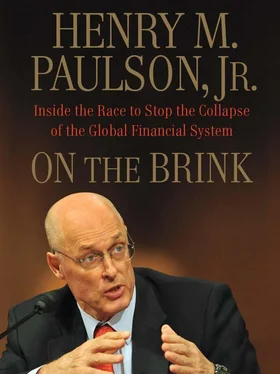Before going to the Hill, I briefed Obama and McCain on AIG. In fact, I spoke to Obama twice before I went to the Capitol. If anything, I overcommunicated with both candidates because I understood that if either of them made AIG or any other part of the crisis into a campaign issue to win political popularity, we were dead. I told them the Fed had to take action and made the point that we were protecting taxpayers—not bailing out shareholders. Again I asked both of them not to characterize this as a bailout.
Ben and I rode to the Capitol separately for the meeting, which Harry Reid had convened in the Senate Rules Committee’s conference room, a modest-size space devoid of tables or chairs, which left all of us standing. The Senate majority leader had gathered an important group to hear us out, including Chris Dodd; Judd Gregg, the ranking Republican on the Senate Budget Committee; and Barney Frank, who arrived late.
I led off by saying the government had decided to act to save the giant insurer, and that Treasury and the Fed were cooperating. Outwardly I was calm, but I could feel the effects of sheer physical exhaustion and the accumulated pressure of the last few days. Ben followed, speaking clearly and precisely. He laid out the terms of the two-year, $85 billion bridge loan we would be making.
There was an almost surreal quality to the meeting. The stunned lawmakers looked at us as if not quite believing what they were hearing. They had their share of questions but were broadly supportive.
John Boehner said we’d be crazy to let AIG fail. Reid put his head in his hands at the size of the loan, while Barney Frank asked, “Where did you find $85 billion?”
“We have $800 billion,” Ben replied, referring to the balance sheet of the Federal Reserve.
Chris Dodd asked twice how the Fed had the authority to lend to an insurance company and seize control of it. Ben explained how Section 13(3) of the Federal Reserve Act allowed the central bank to take such actions under “unusual and exigent circumstances.” It was the same provision the Fed had used to rescue Bear Stearns.
In the end, Reid said: “You’ve heard what people have had to say. But I want to be absolutely clear that Congress has not given you formal approval to take action. This is your responsibility and your decision.”
As I left the meeting, accompanied by my Secret Service detail, I suddenly had to step away quickly from the group, out of sight. All my life, dating back to high school, I’ve occasionally had bouts of dry heaves when I am exhausted or sleep deprived. During the credit crisis, it must have happened six or eight times. That night, as I felt the nausea coming on, I ducked behind a pillar for a few seconds, in front of an American flag hanging from the ceiling. I was concerned that someone from the press might see me, but thankfully no one did.
At 9:00 p.m., the Fed announced that it would step in to save AIG. The company’s board had approved a deal for a two-year, $85 billion loan that would be collateralized by AIG’s assets, including the stock of its regulated subsidiaries, and would be repaid with the proceeds from the sale of the assets. Holding a 79.9 percent equity interest in AIG, the government retained the right to veto dividend payments to shareholders.
Wednesday, September 17, 2008
Tuesday was bad, but Wednesday was worse. Our intervention with AIG didn’t calm the markets—if anything, it aggravated the situation.
I arrived at Treasury at 6:30 a.m. and went straight to the Markets Room. I saw that Morgan Stanley’s situation had deteriorated even further. Its shares were plunging in premarket trading, while its CDS continued to climb. Shortly after 7:00 a.m. the president called. I told him the markets were being driven by fear and that the short sellers were now going after Morgan Stanley as if it were Lehman Brothers. I was very focused on the commercial paper market, where funding was drying up. We were being assailed on all sides.
“We’ve got a real problem,” I said to the president. “It may be the time’s come for us to go to Congress and get additional authorities.”
“Don’t you have enough with the Fed? You just bailed out AIG,” he pointed out.
“No, sir, we may not.”
After promising President Bush I’d stay in touch, I spoke with Dave McCormick, who confirmed the reports that the Chinese had been pulling back. He said he’d spoken with central bank governor Zhou Xiaochuan, who had emphasized that the moves had not been orchestrated by the government but had been made by midlevel bureaucrats and various financial institutions doing what they thought was the smart thing. The Chinese leadership, McCormick said, would be giving some guidance to these professionals not to pull back from the money markets or from secured lending. I told Dave to stay in constant touch with the Chinese officials and keep me posted.
Between 7:00 a.m. and 7:40 a.m., Ken Wilson called me three times to brief me on the alarming calls he was getting: Bank of New York Mellon CEO Bob Kelly, BlackRock chief Larry Fink, and Northern Trust CEO Rick Waddell had all reported requests for billions in redemptions from their money market funds. The Reserve Primary Fund was bad enough, but if these institutions’ funds broke the buck, we would have a full-scale panic as corporations, insurance companies, pension funds, and mom-and-pop customers all tried to withdraw their money at the same time.
Then Ken called me again: his computer screen showed that the demand for Treasuries had become so great the yield on three-month bills had entered negative territory. Investors were now paying for the safety of U.S. government securities. He said it was clear to him the wheels were coming off the financial system.
In the midst of the morning’s gathering chaos, I spoke with Dick Fuld. He had been calling the office, and I felt I ought to talk to him. We hadn’t spoken since the weekend. It was a very sad call.
“I see you bailed out AIG,” I remember him saying. “Hank, what you need to do now is let the Fed come into Lehman Brothers. Have the government come in and guarantee it. Give me my company back. I can get all the people back. We will have Lehman Brothers again.”
I remember talking with Tim Geithner a little later. I said, “I had a sad call from Dick Fuld.” He replied, “He asked you to undo the bankruptcy, right?” I said, “Right.” And he said, “Yes, very sad.” He’d gotten a similar call from Dick. What made Dick’s call and request even more poignant was the fact that it was known by then that Barclays was going to acquire the North American investment banking and capital markets businesses of Lehman out of bankruptcy.
I called Jamie Dimon to get his assessment of the market. I knew I could depend on JPMorgan’s CEO to be cool, clinical, and right on the money. He wasn’t reassuring. “The markets are frozen,” he said.
I’d foreseen the previous Sunday that we would have to go to Congress for emergency powers and fiscal authorities to deal with the crisis. Kevin Fromer and I had discussed this on Monday and Tuesday, but I was leery about going to the Hill unless we could be sure of support there. Getting turned down by Congress on an urgent request of such magnitude could be calamitous. But the AIG rescue had failed to calm the markets, the panic was growing, and lawmakers were getting angry.
Early Wednesday morning, Kevin and I agreed that the problem was so big that Congress had to be part of the solution. I wasn’t going to look for a statutory loophole that would let us commit massive amounts of public money; Congress would have to explicitly endorse our actions. And for the first time I believed Congress would likely give us what we needed. The extreme severity of the market conditions made it clear that no good alternative existed. And lawmakers were scheduled to leave town in nine days to campaign back home, so they had an incentive to act quickly. I relayed my thinking to Jim Wilkinson and Ken Wilson.
Читать дальше












